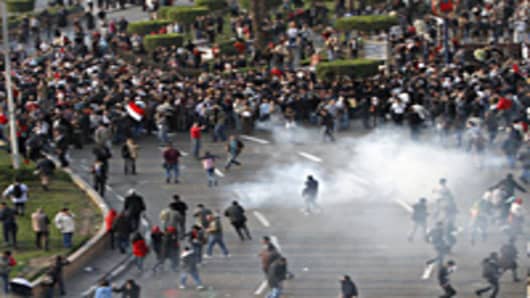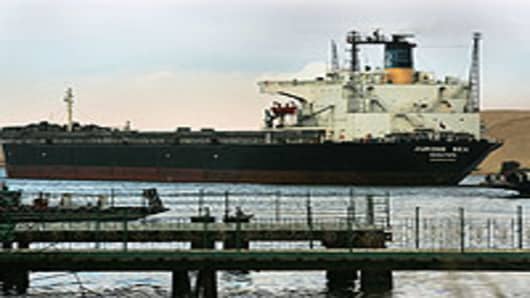Oil, so far, has not reacted to news of anti-government protests in Egypt, but oil traders are keeping a wary eye on the political situation there and in Yemen for signs it could spill into other parts of the region.
OPEC members, meanwhile, continue to talk down the high price of crude. Kuwait Petroleum Corp chief Farouk al-Zanki said in Davos, Switzerland Thursday that he is concerned that high oil prices could contribute to another global downturn and that producers should add to supply to bring the price down in a coordinated way. Oil fell about 1.2 percent on the Nymex to just above $86 per barrel. His comments follow similar remarks from Saudi Arabia's oil minister.
Egyptians have taken to the streets for a third day in the largest protests in three decades. Demonstrators in Cairo and other cities have defied a government ban on protests against President Hosni Mubarak's rule, and police have fired rubber bullets, used batons and tear gas, and reportedly detained about 1,000 people.
Activists are now calling for a mass rally in Cairo after Friday prayers. The Muslim Brotherhood, the banned opposition group, supports the demonstrations and could be a factor in drawing larger crowds to the Friday rally. Mohammed ElBaradei, the Nobel peace laureate and former U.N. nuclear chief, could further energize the protesters when he returns to Cairo Thursday night. ElBaradei has said he would like to see regime change and he is ready to lead the opposition to Mubarak.
Protests have also broken out to different degrees in Yemen, Mauretania, and Algeria, following riots in Tunisia that ended up toppling its government. In Yemen Thursday, thousands demonstrated in the capital Sanaa, calling on Ali Abdullah Saleh to step down after 30 years as president. Protesters gathered in different parts of the city, including the Sanaa University, calling for economic reforms and an end to corruption.
"Yemen is the most troublesome because of its proximity to Saudi Arabia. It's a vulnerable flank to the Saudis," said John Kilduff, a partner at Again Capital.
Standard and Poor's, in a note Thursday, said Egypt, Algeria, Jordan and to a lesser extent Morocco, are more susceptible than other nations in the region to the type of unrest that led to the ouster of Tunisia's government.
U.S. officials have called for government reforms and cautioned Egypt not to crack down on the demonstrators. Egypt has played a pivotal role in U.S. peace efforts in the Middle East and has been a major factor in maintaining stability in the region. Mubarak, 81, has been in power for 30 years and is a key U.S. ally, visiting the White House just four months ago.
"Any major upheaval in the Middle East will be reflected in the oil price, but at this point the oil market is not looking at Egypt," said Dan Yergin, CEO of Cambridge Energy Research. "Egypt is an oil and gas producer in its own right, but it's real significance is its role as a bulwark of stability in the Middle East."
Egypt, as of 2009, produced about 740,000 barrels a day, less than a tenth of the output of Saudi Arabia.
Move to $92 Unlikely
Addison Armstrong, director of market research at Tradition Energy, said, at most, the Egyptian situation could add a little firming to oil prices, "but not enough to take it to $92." He said crude would shoot higher, however, if the market began to believe the Egyptian government could be removed.
"People are watching what's going on there. It's a marker of sentiment for what some people refer to as the Arab Street. I went to the American University of Cairo. I found those pictures to be completely surprising. That never happens in Cairo," he said. Armstrong said he lived in Cairo in the mid-1980s.
"It's a really interesting time in the whole Arab world, where you have this convergence of old decrepit, corrupt autocracies that had a very tight media control, now being impacted by the fluidity of the internet. People can communicate through unofficial channels and organize and have demonstrations. That would not have happened five years ago," he said.
Shibley Telhami, the Anwar Sadat Professor for Peace and Development at the University of Maryland, said the role of the internet and social media are new factors that make predicting the outcome in Egypt difficult.
"I think the story is still preliminary, and we analysts and social scientists are kind of trained to predict events based on patterns of the past. Historically, you have these uprisings and you have these regimes feeling somewhat threatened. Then they find a way to absorb public venting and find another way to survive another day. That's been more the norm than not, and most people are betting the Tunisia events are not necessarily going to spread as widely as the public is hoping it would," Telhami said.
"Even when no known successor is evident, changes have taken place in a relatively orderly fashion. In Egypt itself, Nasser died, Sadat became president. Sadat died, Mubarak became president," he said.
"What we see here is a dynamic of this in the age of satellite television, the internet and social media which is clearly crating a variable of the likes we never witnessed," he said. Because of this, he added: "I cannot use the past to predict the future."
Telhami said the Tunisian revolt was surprising in that it was leaderless, unorganized and spontaneous. "We know there are reasons for people to revolt in the Arab world. We've known for decades. The puzzle for me, as a political scientist, has been not when will people have a reason for revolt, but more 'my God, why haven't people revolted yet?"
"The answer was of course that the governments were very good at preventing organizations or demonstrations. They put in place a very successful military order and bank on the military and use incentives and threats to survive," he added.
He also noted that Egypt is not like Tunisia economically and that it has experienced growth. "It as a consequence put pressure on the lower income people, so Egypt has had issues with food prices," he said. "There's really nothing new. You could say it's always been an element that people are paying a price for the regional economy, or even the local economy, but there's nothing new in that that you can point to and say this is profoundly different form previous episodes. Egypt has engaged in food riots in the past, which is not new and this is not what this is. There's no question that this particular revolt is inspired by Tunisia," he said.
Questions? Comments? Email us at marketinsider@cnbc.com




